In April of 2022, a young man named Christian Smalls led a powerful unionization drive at the Amazon warehouse in Staten Island, New York. An 8,000 person work force was working under conditions that Smalls, and others, found unfair and unsafe particularly during the COVID pandemic.
Amazon spent over $4M to deter Smalls’ unionization efforts, which he funded with $120,000 raised on a Go Fund Me page. Yet as everyone now knows, Smalls’ David beat Amazon’s Goliath; the final vote was 2,654 yes votes, 2,131 no, with 68 challenges. While Amazon was left with more arrows in its quivers with which to beat unionization, the vote at JFK8 was a historic win with an indisputable emotional and psychological effect on labor activists around the country.
Was Amazon’s material power enormous compared to that of Smalls and his friends? Oh yes. Was it almost ridiculous to think that Smalls - particularly with so few resources compared to Amazon’s - would be able to rally enough support for his efforts? Absolutely. So what happened there? What was it about Smalls - about his commitment and his perseverance and dedication to his cause - that despite the forces arrayed against him enabled him to work a miracle?
Speaking on the New York Times Daily podcast, Smalls referred to the process as “spiritual.” He said the effort was built on “love and caring for one another.” Amazon spent millions of dollars on anti-union consultants; Smalls put up a folding table on public property near the bus stop outside the warehouse, talking to Amazon workers as they got off and on the bus day after day, night after night. He talked to workers, he listened to their stories, he helped where he could, he built a community of sorts. They all sang together, he said, and even prayed together. In the end, the power of connection, community, human sharing and understanding, overcame Amazon’s gargantuan material power.
Many have referred to Smalls as the David to Amazon’s Goliath. And there was far more to the Biblical David and Goliath than simply their difference in size. First of all, David wasn’t even a warrior; he was a shepherd delivering food. He knew nothing about fighting. But his heart was touched by the pain and fear of his brothers, and it was that which inspired him to volunteer to take on the giant. He was bound to win … because the giant had no soul.
Smalls, like David before him, was going to hit Goliath in the one place where it has no defense: its lack of conscience. With his slingshot David hit Goliath at the midpoint of the giant’s forehead, a point referred to metaphysically as the Third Eye. If you have a conscience and the opponent doesn’t, then ultimately you will win.
A soulless neoliberal economic order, devoid of ethics and human compassion, will have no power once confronted by a politics of love, of radical humanitarianism. The way Smalls discussed his union drive made me think he understands that.
Amazon didn’t know what hit them.
Most experts in the field of union organizing would have doubted Smalls’ effort, and the executives at Amazon certainly did. Amazon’s general counsel made the mistake of emailing a thousand people to describe Smalls as “not smart and not articulate,” a line that will go down in history as the famous last words of a dinosaur system. They became a rallying cry not only for Smalls but for thousands of people who could relate to the experience of their legitimate calls for justice going unheard, their needs being dismissed, and their very way of speaking being derided.
The Amazon executive said he hoped the press would focus on Smalls as a kind of mascot for the unionization effort, as he felt it would be good for the company on the public relations front. If ever there was a “watch what you wish for” moment, that was it.
Smalls didn’t try to look or sound like a union leader is “supposed” to look or sound. Nor did he look to professional organizers to build his union. He knew the experts had failed in their effort to unionize the Amazon warehouse in Bessemer, Alabama; only Smalls knew the workers themselves and what they were going through on Staten Island. He’s unabashedly of a new generation of labor leadership that is going to do things their way.
We can’t beat the old system with the tools of the old system, for the old system is loveless. If we put our lovelessness up against its lovelessness - and it has more money or power of brute force than we do - then we will lose. It is only when we claim the power of deep human connection, of the authentically human, that we can invoke nonviolent revolution. Call it solidarity, call it community, call it brotherhood or call it love - whatever you call it, it’s the key to transforming the world.
Interestingly enough, it was the American labor union advocate Nicholas Klein (not Gandhi, to whom the words have often been misattributed), who in 1918 said, “First they ignore you. Then they ridicule you. And then they attack you and want to burn you. And then they build monuments to you.” The quote was become popularized as “First they ignore you, then they laugh at you, then they fight you, and then you win.”
Whichever way we say it, the point is that it’s true. There will definitely be monuments to Christian Smalls one day. He brought a deep human dimension to a field that had grown dry and sclerotic, like bringing a withered flower back to life. He, more than any other individual, has made labor organizing a thing again. He did something that so needed to be done, and now thousands upon thousands more will have the courage to do it too.
I admire him greatly, and I hope you enjoy our conversation...
(The episode can also be found on Spotify and Apple Podcasts)
Marianne Williamson:
Hi everybody, Marianne Williamson here, thank you so much for being with me. This is an exciting interview for me. It's something I've been wanting to do. It has been scheduled and rescheduled. I could do it, but then he couldn't do it. He could do it, but then I couldn't do it. And finally today was the big day I got to interview labor organizer Chris Smalls.
Christian Smalls is someone who has already made history in his young life. He has actually led a successful union drive at Amazon.
Amazon as we know is a huge corporate behemoth, and it is one of these huge corporate entities that has done everything in its power to keep unions out of its shop. Now, you might say, as I think any reasonable person would say, with the billions of dollars that Amazon makes - the billions of dollars in profit that accrue not only to its stockholders but also to the big man himself, Jeff Bezos - why would they not want to give workers all the safety benefits? All the health benefits, all the things that will just enable those workers to have a dignified life, to make a living wage and to be able to work with some happiness and some productivity and creativity that feels natural to them on a daily basis?
Well, as you probably know, that is not the way Amazon has seen it. So Christian Smalls is the man who did what they said could not be done. He successfully unionized the Staten Island, New York warehouse, JFK8 in April of this year. Nobody would've thought that he could do it. It began when he was working at Amazon and he was upset by the lack of safety measures that were being taken at the beginning of the pandemic, when COVID was particularly dangerous. The company was not taking the measures that they needed to be taking to ensure the safety of its workers.
He was just blown off. Then when he tried to stage a walk out, they fired him illegally and Amazon spent over $4 million on labor busting activities. They brought in the big guns. They brought in the so-called experts. Christian Smalls, and the gentleman who was his partner in this effort, Derrick Palmer, they raised $120,000 on a GoFundMe page. They did what they said could not be done.
They built community. They built solidarity. They took a folding table, folding chairs, set them up outside the bus stop where workers came and went every day. They had food, they sang, they famously smoked weed and they talked and they prayed together. And they explained to people why it was to their benefit (to form a union). Now, even as we speak, Amazon is contesting the election saying it needs to be held again, complaining that the NLRB, the National Labor Relations Board was unfair in its help that it gave to the union.
They're saying all the things you would expect them to be saying right now, but Christian Smalls has already made history. Christian Smalls has already enlivened single handedly, practically, the labor movement in this country along with incredible people like Sarah Nelson, so many others as well. There are thousands of people and more who have been involved in the larger effort. Now look at what's going on at Starbucks, what's going on at Walmart.
What's starting to go on at Apple, Google, this is now a fire that has been lit. Labor is coming back and it's coming back in large part because of this one young man, Christian Smalls. I hope you enjoy our interview.
Marianne Williamson:
Chris Smalls, thank you so much for being with me. I'm really grateful, and I have really looked forward to speaking with you.
Christian Smalls:
Thank you. Thank you for having me.
Marianne Williamson:
You are very much man of the season. You've already made a historic difference, not only in the labor movement, but in our contemporary relationship with capitalism itself. People will be talking about you decades and longer from now. My interest in you, what I've thought about so much is why you? And so I'd like to discuss that with you today if you don't mind going over some of those details with me. You had been working at Amazon and you had a problem with the fact that you felt that they were not taking care of the health and safety of its workers in a way that was appropriate during COVID. Is that correct?
Christian Smalls:
Yes, absolutely.
Marianne Williamson:
Okay. So when you first went and complained about that, what kind of response did you get?
Christian Smalls:
It pretty much was just negative. It was nothing that was really a solution to what we were asking for. It was just nonchalant, business as usual, not really worried about our concerns. We needed PPE, we needed some guidance on to how to socially distance. It was nothing. It was just very vague. It wasn't really reaching anybody on the shop floor and I just couldn't stand with it.
Marianne Williamson:
So when you went and made that complaint, were you alone in the office with the HR person or were other people with you?
Christian Smalls:
At certain points, other people were with me, but initially, no. I went by myself and then I brought larger groups days following especially after my colleague tested positive, I started to organize workers in the break room.
Marianne Williamson:
So we all have to remember, this is at the height of the COVID pandemic? This is when this was a very serious situation, people were getting sick. What I'm curious about is your perseverance. What I'm curious about is the fact that they did not stop you.
Now, if it had not been you, what would've happened for most people who were at Amazon at that time? They go, they complain to HR, HR just brushes off their complaints, and then what happens? Did people just figure there's nothing we can do?
Christian Smalls:
It would've been a lot more people deceased had I not did what I did. People would have lost their lives had I not did what I did. Amazon was forced publicly to provide the PPE and they made sure that week after I was fired, that they dropped all packages right to JFK8. And unfortunately, people still died that I've known that worked there.
Marianne Williamson:
So you're angry at that point, you feel the sense of injustice and you keep going. You don't let it go. You stage a walk out. At that point, Amazon starts realizing we might have a problem on our hands, but we don't really have a problem on our hands because Chris Smalls is "Not smart, not articulate." When you first do stage a walk out though, they fire you, right?
Christian Smalls:
Yes, two hours after the walk out on the same day they fired me.
Marianne Williamson:
What is it about you? What was going on inside you at that point that you said, "I'm not stopping." What was happening inside you? Who was talking to you? Was it friends? Was it family? Because not everybody would've persevered the way that you did. What was going on inside?
Christian Smalls:
Well, yeah. At the time, I was devastated by obviously losing my main source of income. So of course, I had to talk to my relatives, my mother.
Marianne Williamson:
I knew you were going to say your mother.
Christian Smalls:
Yeah.
Marianne Williamson:
I knew it. I knew it. All right. Tell me, what did your mother tell you, Chris?
Christian Smalls:
Well she always told me no weapon formed against me shall prosper. And she just motivated me to continue fighting for what's right. And I spoke to out of nowhere, Reverend Jesse Jackson called me, so I spoke to him. He really uplifted me, he gave me some legal counsel. And from that moment, I just continued to embrace whatever was thrown at me.
Marianne Williamson:
Right. So when you went down to Bessemer, Alabama, and you offered to be of service to their unionization efforts down there. That effort was being led by the people who supposedly know how to do all this. And they shoved you aside too. What did you know? You were just a worker, right? That would've also felt insulting and defeating.
Christian Smalls:
Yeah, it was definitely disheartening that I wasn't along with the people I went with who are actually Amazon workers that we didn't really have a connection with the union down there to really help them the first time around, which I saw we wanted to do originally. But we learned from their mistakes, we learned from the opportunities that we saw and we tried it our own way. And we don't regret the decision that we made. I felt that you're going to make decisions based on the workers in the warehouse, then who better than the workers in the warehouse.
Marianne Williamson:
I heard you say, actually, in talking about the community that you built. You got your folding chairs and your folding table, and you just set yourself up at the bus stop. You would bring food. Sometimes you would bring food that was more familiar to some of the immigrants who were the workers there, you would sing songs. You said you would pray together. You famously smoked weed together which Amazon is trying to use against you. Everybody else is saying, "Well, that was smart."
Explain not only the community building that you did, but I want to go back a little bit to this David and Goliath issue as I'm sure you know because I'm sure your mother taught you well. King Saul took off his coat of armor and said to David, "If you're going to do this, the least I can do is give you my coat of armor." He put on Saul's coat of armor and gave it back, said, "If I'm going to do this, I have to do it my way." You pierced this incredible wall of power represented by Amazon, huge corporate power. You pierced that wall and you pierced it through the level of community building that you did. Am I correct?
Christian Smalls:
That's absolutely correct. Yeah, we wanted to do it our way. We really didn't even have to reject help because we didn't get any. So to know that we did it our way and to really be successful, there's no greater feeling. And to have it worker led through and through, the workers understand the power now. And that was the only way and the best way that could have been done, to have them do it themselves.
Christian Smalls:
And to me to be this outside, presence at the bus stop, knowing the ins and out of the company, we definitely wouldn't take it back. This was the way to do it, and we're just happy to share this experience with the world.
So originally, we were approached by some unions that wanted to affiliate which means that obviously, we had to start over our campaign. So that was a no go, and then the rest were very vague type of help or if any, we didn't get it. So we didn't ask and vice versa. Yeah.
Marianne Williamson:
So you have already made history. You've already demonstrated what's possible. You've already started the reemergence of labor in a way that we have not seen in decades in this country whether it has to do with people at Starbucks, people at Apple all over the country now, there is this burning fire. First of all, I want to ask you about the efforts going on right now. You do feel that the NLRB, National Labor Relations Board, you do feel that they have served you well and that they have been fair and helpful, correct?
Christian Smalls:
Well, they've done what they can do. It's still a ways to go. Their laws are obviously outdated. They're way understaffed, they're way underfunded. So it really is a question is did the administration allow this NLRB to help us out? And the answer to that is they have some work to do. We want the PRO Act to be passed. We want some of these remedies to be quicker.
It shouldn't take two years for somebody to get fired and get their job back. Companies shouldn't be able to control and dictate certain things that they are able to do now. And we're dealing with that as we pretty much progressed through our campaign. We're learning that there's still some things that need to be worked out when it comes to these labor laws in this country.
Marianne Williamson:
Well, right now, Amazon even as we speak is trying to get the election overthrown. What are the other things to which you're referring? Where you feel the administration could be giving you and by extension the entire labor movement right now greater support in its efforts?
Christian Smalls:
Well, number one, they definitely shouldn't be given $10 billion to Amazon which they are. That doesn't make any sense, and then these are taxpayer dollars. The public needs to be outraged as well. Not just the workers, it's not just up to the ALU and the workers to take on all of the responsibility for holding this company accountable. Biden should be using that executive order pin. There's something that he can do right now to help workers out immediately.
Marianne Williamson:
I want to make sure that nobody misses out on this. First of all, that 10 billion, right?
Christian Smalls:
Yep.
Marianne Williamson:
(Biden) had said at the beginning of his presidency that he would not be giving any government contracts to companies that were actively opposing unions, but that's an example of his doing exactly what he said he would not do. What are the other things that he could do by executive order right now to be of greater support to unions?
Christian Smalls:
Well, definitely signing an executive order if the PRO Act is not going to pass, there's certain things that they can take and get into order right now. Also, just allocating some more money towards the NLRB on a national level. We need to staff these offices so that they can take on the amount of cases and inquiries that are coming from workers. They can't even really keep up.
Marianne Williamson:
Yes. That's what I heard from union organizers at Starbucks when I asked about the NLRB. They said, "Yeah, they're trying." But they're understaffed. We have this idea of this huge government agency, but it's actually just a much smaller office than you would think, and that it should be. Okay. So we know the success that you have been. We know that regardless what they do now, regardless of even if they overthrow the election, you've already pierced the wall.
You have already inspired the imagination. You have already given hope to thousands, if not millions of workers out in America to think, "Well yeah, maybe I could start a union. People who know that they can get online and see how it's done." I want to throw another compliment at you if I may. When this all happened, I was really looking as I'm sure many people were really looking closely at you because all of a sudden, you were all over the media and you did not waver. The kind of seduction techniques that the system uses to pull people over. Just please know that your demonstration of the solidity of your convictions, your unwillingness to waver, please know what a difference it has made to so many of us who are looking very carefully at what's going on.
Christian Smalls:
Well yeah, just thank you again for that compliment as well. Right now, the labor movement definitely is reaching different platforms that we haven't seen. It's unprecedented at these times. And I know I'm a big part of that going on different platforms, talking about labor, that's something that's necessary. And I see that the labor movement right now needs to be led by the younger generation.
There's no other way around it. The older established unions are starting to see the resurgence of this type of revolution, the Starbucks workers, the Apple, Google, Amazon, you name it. Even Walmart, Dollars General, Target, they reached out to me. So it's just a beautiful thing to see really.
Marianne Williamson:
So what I hear you saying is that you recognize that your leadership role is not just in regard to what happens at Amazon, but that your leadership role along with people such as Sarah Nelson and others has to do with the larger picture of the reemergence of labor at this time.
I know you had a friend, Derrick Palmer I believe.
Christian Smalls:
Yes.
Marianne Williamson:
Who really he joined with you, and I think that was a big deal. Having even one person who really believes in an effort, but in terms of the overall workforce at Amazon, was it a slow slog trying to convince people that this was possible? Trying to convince people it was a good idea? Did people seem too defeated to think it was possible?
Christian Smalls:
Yes. We definitely had to spend a large portion in the beginning of our campaign just educating people on what a union is. At first of course, there's so many questions. There was several conversations to be held, and it took some people two to three months to come on board, even some members of our core leadership with the ALU. Some of them didn't come until well after our first petition was even filed.
So it took people time. It took people coming back to the bus stop, talking to me directly. There's been a lot of that throughout the course of the campaign, and just Derrick present along with the other leaders inside the building every single day advocating even though the company was union busting so hard. Just having that militancy in the building showed the workers that when we come together, there's nothing that could stop us.
Marianne Williamson:
What were the fears that people had about joining a union?
Christian Smalls:
Well, it's always about the money. Amazon always tried to make it about the union dues. They know that these workers barely make enough as it is which is sad because they work for them and they can pay them more, but they know that these workers are living check to check. So of course, to threaten somebody else, a third party which they tried to refer to us as coming in to take union dues, that's going to put fear in anybody's mind who thinks that we're coming to take their money and to make me rich, or to make me a millionaire. They even told the workers at one point that I'm going to take the union dues and go buy a Lamborghini. It was just making up just silly things every single week, and we had to combat that.
Marianne Williamson:
Then of course, the over $4 million that Amazon spent was on professional union busters. So these techniques are very tried and true for them. And if we will continue to just talk to people. Now, in the current effort that Amazon is making to overturn the election, are you hopeful about that that this will be okay and that they will not be able to do that?
Christian Smalls:
Very hopeful. We know, and I know that we followed the rules through and through. We didn't cheat, we beat them fair and square. Even if you can say fair and square, we're talking about workers beating a trillion dollar company and they're crying wolf. That's just what it is. They're mad that they lost and they're going to spend every dollar to try to overturn it, but there's nothing there. They're just dragging this out. From what I understand, I can't even tune in because we are removed from it. We just hope that the NLRB and we have a good set of lawyers that are fighting for us. We hope that the decision goes our way.
Marianne Williamson:
Jeff Bezos has so many billions of dollars. He's one of the richest men in the world. Amazon has profits of so many billions and all we're talking about is creating a situation where the workers for a company can have a living wage, dignity, reasonable benefits so that they can live a quality life. How does that just make you feel on a personal level that this corporate giant who has so many billions of dollars is working so hard to block you? Where are you in your heart about that?
Christian Smalls:
Yeah, it really just makes no sense how much greed somebody can have in a lifetime. Just thinking about the fact that one million of these dollars, one million can pay everybody $30 an hour.
So it's just disheartening to hear it when you put in that perspective, but it also just continues to motivate us what we're fighting for and we're not going to give up no matter what they do, no matter how much union busting money they spend. The workers are past that point of return. There's no going back to what we saw and what we were getting pre-COVID. This is the turning point, and I think workers know their value now.
Marianne Williamson:
In this latest more modern era, the suppression of the union and the demonization of unions has been so strong for the last few decades. You have clearly made a dent in that in terms of the consciousness of the workers. What about just America in general? Do you think America's waking up just as a country to the recognition that the labor movement is an important antidote to overreach by capitalism?
Christian Smalls:
I really believe that the tides are definitely turning. Once again, labor is booming and up from I think it's believe 57% of unionizing elections this past year. So yeah, there's definitely something brewing here in the country nationwide. I've been traveling the country, I'm called the Hot Labor Summer Tour. I've been traveling ever since we won. I'm continuing to do so to spread awareness, spread our message and to really inspire people that want to unionize and no matter what industry you're in.
So yeah, I think the conversation is starting to move. We just have to continue once again, keep our foot on the gas. We can't let up. We can't rely on the politicians. We can't rely on the corporations. Damn sure can't rely on our bosses to give us what we want. We have to go get it.
Marianne Williamson:
Is there anything else that you want people to know? That you want people to remember?
Christian Smalls:
I just want people to know and take note of what they witness. We're just ordinary people that came together. As I speak right now, I am an unemployed worker no matter if you're employed or not, you're still a worker and we're all a part of the same struggle. When we come together, we can defeat companies like Amazon. We can defeat companies like Walmart. It's just up to us to really come together and build off a commonality.
I already said it to Lindsey Graham, it's not a left or right thing. It's the worker thing, and we've got to come together as people and really take on and fight back for what we rightfully deserve.
Marianne Williamson:
When you were speaking at a congressional hearing to Lindsey Graham, the one you just mentioned that of course was televised. I felt that something in him heard you and knew that you were speaking truth. Did you feel that way?
Christian Smalls:
At the moment, no, of course not, but I obviously watched the tapes and seen that that moment took off on the internet, I said, "Okay, maybe he did listen to me. Maybe not, but just to have workers speaking in the court hearing, that felt good." Workers need to hear that, people need to hear that message, and I'm glad that it resonated.
Marianne Williamson:
Well, you're making a very important point right there. It really doesn't matter whether or not Lindsey Graham heard you. What matters is that America heard you. And once again, the way you spoke to him, much like the way you spoke to Tucker Carlson, you do not waver from what you know to be the moral truth and integrity of your words. And it really obviously does not matter to you who buys it because you're talking to the larger audience of who's listening. God bless you. I think you're incredible, and if there's any way that I could possibly contribute to what you were doing, please call on me anytime. I'm one of your biggest fans.
Christian Smalls:
No, I know already, and I appreciate everything you've done for me already, and your support as well, very much needed in this fight. And yeah, just speaking about David and Goliath, the shirt that I'm wearing is actually David and Goliath. Somebody designed it.
Marianne Williamson:
Absolutely. He hit him in the third eye. He hit him in conscience, that's the one place where, and this is a very important spiritual truth about the story of David and Goliath. The one place where the giant was undefended was in the seat of the soul. And that is what you do, you speak right into conscience. You speak right into the hearts knowing that's how you made the movement happen.
Marianne Williamson:
I'm not surprised to hear that your mother had something to do with that. I have heard the little things that you've said about how the movement itself was spiritual, about how you prayed that morning. A lot of people have heard and have listened and you have definitely demonstrated the power of David to speak to the seat of the soul, and I think that you've only just begun. You've already made history and I hope you make a lot more of it. God bless you, sir.
Christian Smalls:
Thank you. Thank you. Thank you.
Marianne Williamson:
Thank you. Thank you so much.
Okay, that was my interview with Christian Smalls. I hope that you enjoyed it as much as I did. Christian Smalls has made history and now, the rest of us have to find it in our hearts to do that which they say cannot be done. If you are working in a company or in an industry where you feel that there needs to be a union and there's not, I hope that you will go online, that you will find all the ways that you too could start a union drive among the people that you work with.
This is a movement that having begun in the way it has now, this reemergence of labor - the fire has started and it's not going to stop. So if this is meant for you, I hope you'll take action. In the meantime, thank you for being with me. If you're enjoying the podcast, please subscribe, rate, and review on Apple podcast, check us out at YouTube. And remember, we all have an inner Christian Smalls. All my best to you. I'll see you next time.


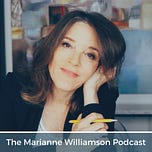

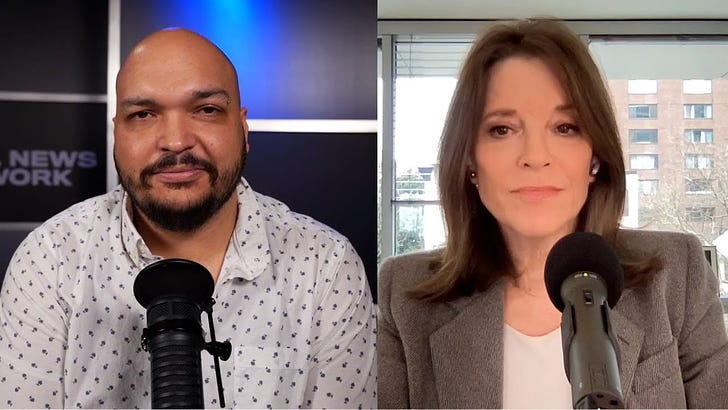
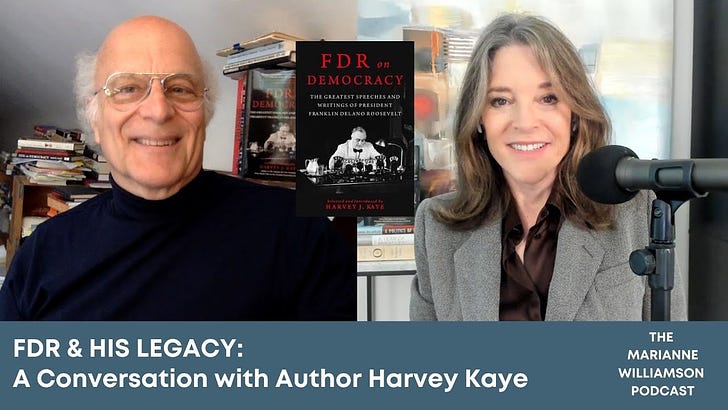
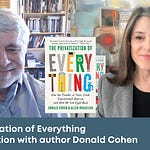
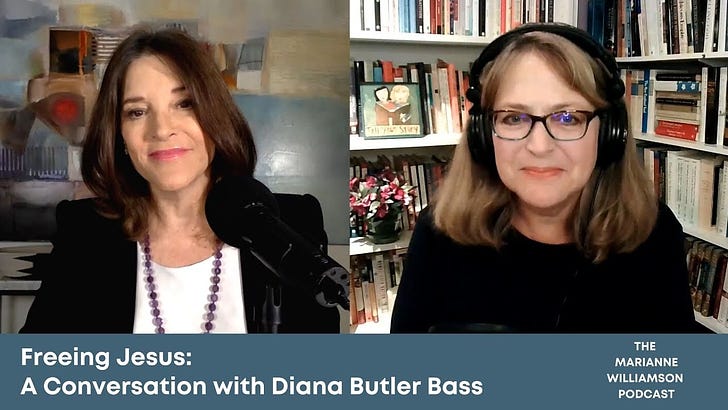

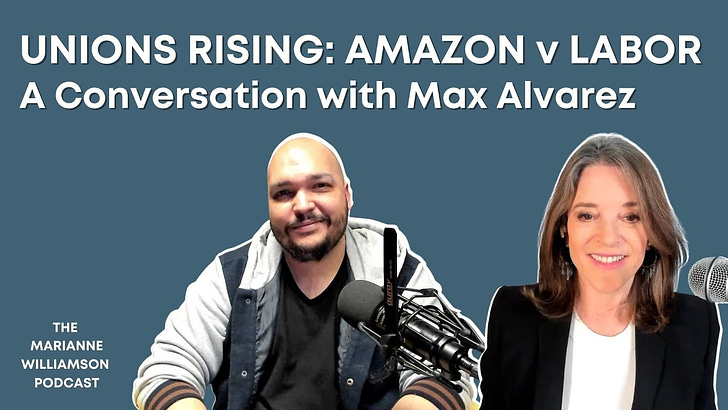

Share this post